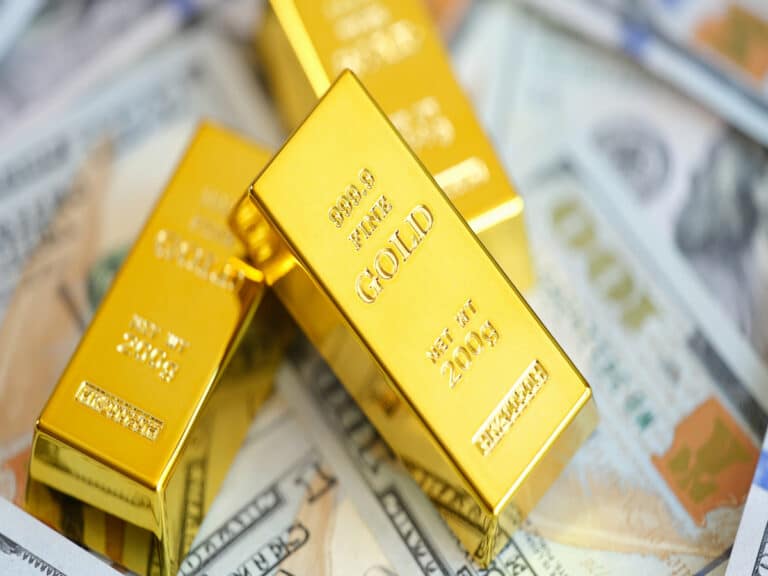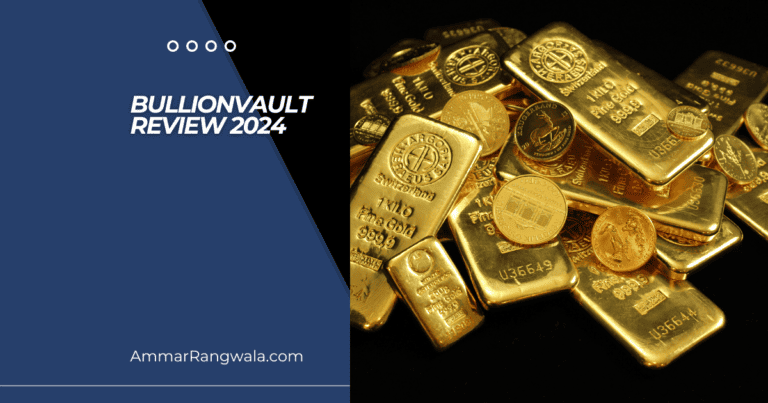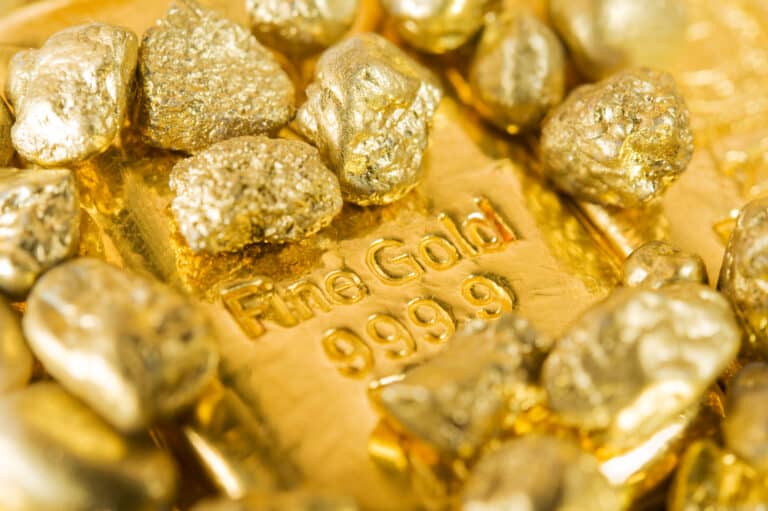Is Gold Magnetic 2024? The Answer Is Amazing

Gold has captivated the imagination since ancient times due to its luster, rarity, and durability. But is gold magnetic? This question has intrigued scientists and gold enthusiasts alike for many years. In this article, we will explore whether gold is magnetic and what causes it to behave the way it does. So let’s dive in!
History of Magnetism and Gold
The study of magnetism dates back to ancient Greece, where the first magnetic mineral, lodestone, was discovered. On the other hand, gold has been one of the most sought-after metals since ancient times, prized for its beauty and rarity. However, it wasn’t until much later that scientists began investigating whether gold possessed any magnetic properties. Early experiments revealed that gold was not attracted to magnets, leading many to believe it was non-magnetic. But is that the case? Let’s find out.
Scientific Explanation About Gold’s Magnetic Properties
Gold is not magnetic in its purest form but can become slightly magnetic when combined with other precious metals such as iron, nickel, and cobalt. This property is known as diamagnetism, meaning it has a weak opposing force to magnetic fields. Gold will be repelled and move away from the magnet when exposed to a strong magnetic field. However, this effect is so weak that it can only be observed under highly controlled conditions in a laboratory setting.
Misconceptions About Gold’s Magnetism
One common misconception about gold’s magnetism is that it can be used to test the purity of the metal. This belief stems from the fact that some other metals, such as iron, are magnetic, and impurities in gold may contain them. However, this is not a reliable method of testing purity, as the magnetization of gold is too weak to be affected by small impurities. It is always best to rely on other ways, such as acid tests or X-ray fluorescence analysis, for accurate results.
Another misconception is that gold can be used in magnetic storage devices like hard drives. While metals like iron and nickel are commonly used in these devices, gold’s diamagnetic properties make it unsuitable for this application. Additionally, using material as valuable as gold for such a purpose would be highly impractical.
In summary, gold is not magnetic in its purest form but can exhibit weak magnetic properties when combined with other metals. However, these properties must be more vital for practical use and should not be relied upon for testing purity or use in magnetic storage devices.
Tests to Determine if Gold is Magnetic
Several tests can be done to determine if gold is magnetic or not. A straightforward test involves holding a magnet near the gold and observing whether it is attracted or repelled.
Another method uses a sensitive gaussmeter, which can detect weak magnetic fields. However, as previously mentioned, there may be more reliable tests for determining the purity of gold. Acid tests and X-ray fluorescence analysis are more accurate methods for determining the composition of a gold sample.
These methods involve subjecting the sample to various chemicals or radiation and analyzing the resulting reactions and emissions.
Ultimately, relying on these more accurate methods for testing gold purity rather than depending on magnetic properties alone is important. It is also important to note that while gold may exhibit weak magnetic properties when combined with other metals, it is unsuitable for magnetic storage devices due to its diamagnetic properties. Therefore, understanding the true nature of gold’s magnetic properties is essential for accurate testing and practical applications.
Test Results
The results of various tests to determine whether gold is magnetic vary depending on the method used. Simple tests involving a magnet may show slight attraction or repulsion, but these properties are not strong enough to be relied upon for testing purity. Sensitive gaussmeters can detect weak magnetic fields in gold, but this property alone should not be used as the sole purity indicator.
More accurate methods, such as acid tests and X-ray fluorescence analysis, are necessary for determining the composition of a gold sample. Ultimately, magnetic properties alone should not be relied upon for practical applications involving gold due to its diamagnetic properties, which make it unsuitable for use in magnetic storage devices. It is essential to rely on accurate testing methods to determine gold purity and understand the true nature of its magnetic properties.
Real Gold is Not Magnetic
Pure gold is not magnetic due to its inherent diamagnetism, producing a weak opposing magnetic field when exposed to a magnetic field. While gold may exhibit slight attraction or repulsion when combined with other metals, it is not strong enough to be considered magnetic. This property of gold makes it unsuitable for use in magnetic storage devices and means that relying solely on magnetic properties for testing gold purity is unreliable. More accurate methods, such as acid tests and X-ray fluorescence analysis, are necessary for determining the composition of a gold sample.
Discussion of Gold Alloys and Their Magnetism
Many alloys contain gold, and their magnetic properties vary depending on the other metals present in the alloy.
For example, white gold contains nickel or palladium to give it a silver color, and these metals can make the alloy slightly magnetic. Similarly, rose gold contains copper, which may cause slight attraction to a magnet.
However, the amount of gold in the alloy can also affect its magnetic properties. Higher-grade gold alloys with more than 18 karats (75% gold) are generally less magnetic than lower-grade alloys with less than 14 karats (less than 58.3% gold ). It is important to note that while these alloys may exhibit slight magnetism, they still need to be more suitable for magnetic storage devices and should not be relied on to test gold purity. Accurate testing methods such as acid tests and X-ray fluorescence analysis should still be used to determine the composition of the alloy.
Practical Applications
While gold is not magnetic, there are practical applications for using magnets with gold-containing materials. For example, magnets can separate gold from other metals in the refining process or recover gold from electronic waste. In addition, magnetic nanoparticles coated with gold can be used in medical imaging, targeted drug delivery, and detecting pathogens and environmental pollutants. While these applications do not rely on the magnetism of gold itself, they demonstrate how the properties of gold can be enhanced when combined with magnetic materials.
Use Cases
Magnetic materials have various use cases in the jewelry industry. One example is magnetic clasps, which provide a secure and easy-to-use closure for bracelets and necklaces. Another application uses magnets in jewelry polishing machines, allowing for efficient and effective polishing. Magnetic materials are also utilized in jewelry displays and packaging to provide an attractive and functional presentation of products. Additionally, magnetic fields can detect fake gold jewelry by testing magnetic properties that differ from authentic products. These uses demonstrate how magnetic materials can enhance jewelry products’ functionality and aesthetics.
Impact of Magnetism on the Value of Gold
The magnetic properties of gold do not directly impact its value as a precious metal. However, using magnets in refining and recovery processes can increase efficiency and decrease production costs, potentially lowering the market price of gold. Additionally, the magnetic susceptibility of counterfeit gold can be used to identify fake products, which can affect consumer confidence and ultimately impact the demand for authentic gold products. Overall, while magnetism may indirectly influence the value of gold in specific contexts, it is just one factor among many that determine its worth as a valuable commodity.
Conclusion
In conclusion, gold itself is not a magnetic metal. However, magnetic materials play a significant role in the jewelry industry, from clasps and displays to refining and counterfeit detection. While magnetism may indirectly impact the market price of gold, it is ultimately just one factor among many that determine its value as a precious metal. Regardless, the beauty and allure of gold will continue to captivate individuals for generations to come.
Ammar has started several online businesses and is a blogger who loves providing quality content to help others. He is involved with affiliate marketing, domain names, NFTs, and cryptocurrencies. Check out my blog if you want to learn more about these areas and business in general.






